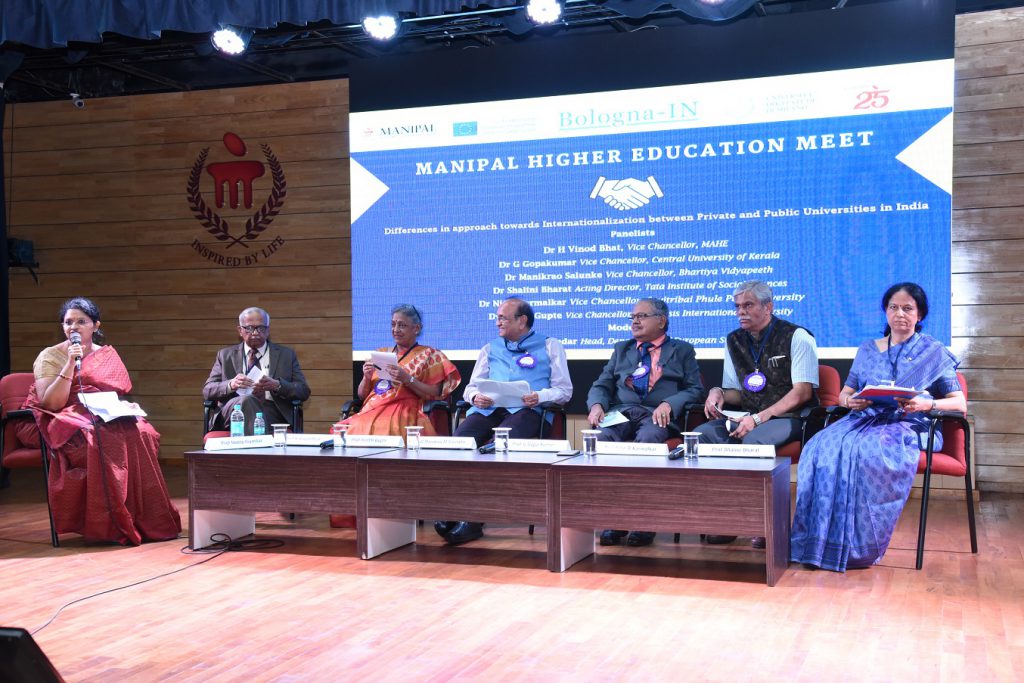By Priya Vijaykumar Poojary
The current political shifts in the form of increasing populism, the resurgence of nationalism, structural racism, and the pandemic are altering global political environments. These shifts are occurring in tangent with the internationalization of higher education as we witness new regional higher educational models (both intra- and inter) and increasing cross-border academic mobility. Thus, higher education institutions (HEIs) while situated in their national ecosystems are increasingly impacted by the political shifts (Smith & Freeman, 2014), creating (at times) newer borders or redefining the existing borders in what we term as cross-border education.

Manipal Higher Education Meet in 2018
Just as universities constitute sites of producing and reproducing political, social, and economic (in)equalities, they also provide platforms for resistance. These and other such issues will be discussed at the India-EU Higher Education Meet titled Reimagining Borders in Cross-Border Education, October 7-8, 2021. India-EU relations in the past few decades have been increasingly strengthened through education – academic exchanges, mobility of students and staff, research collaborations especially through some of the recent initiatives such as Horizon 2020 and Erasmus programmes. Funding programmes such as Jean Monnet Chairs and projects, Centres of Excellence, Networks and Capacity Building in Higher Education (CBHE) projects have played crucial roles in strengthening academic association between India and Europe (Inamdar and Hegde, 2021). Since 2014, India has been the recipient of the highest number of grants under the Erasmus Mundus Joint Master Degree (EMJMD) programme. Under the Marie Sklowdowska-Curie programme, 1397 Indian researchers were funded while under the Research and Innovation staff Exchange (RISE) mobility, 28 researchers from the EU came to India. These numbers are clearly indicative of the visible imbalances in the flow of knowledge seekers between the regions where on the one hand a large number of Indian scholars go the EU, very few come to India. There is a definite necessity to introspect on the challenges that promulgate such imbalances.
These realities call for a reassessment of not only what constitutes knowledge, but also what encompasses the idea of borders. In this conference, we wish to address borders of different kinds – economic, political, racial, systemic, epistemic and institutional – and at different levels, while seeking sans-border education. These borders (varied in nature and form), have constrained higher education, necessitating us to introspect them and maybe in the future even overcome them, thus championing universality at the heart of university systems. We are interested in understanding whether the existing shifts can contribute to greater inclusivity in cross-border education. Our attempt is to foster a dialogue among scholars across borders on the inclusive role that education can play and how universities in particular can become significant political actors in the process. This will not only lead to a more robust understanding of the universities as critical actors but also enable us to debate and deliberate on the conceptual contours of what constitutes borders in cross-border education.
How can we generate knowledge that is of local relevance and inclusive of perspectives of people from diverse cultural and socio-economic backgrounds? How do debates on indigenization of curriculum and knowledge production correspond to the role of universities in driving sustainable development? Fundamental questions concerning the nature of knowledge formation, its flows, and its consequences on social equality as it interacts with global issues of migration, modernization, and geopolitical changes will also be discussed at the Meet.
The emergence of newer regions of knowledge including the creation of an ‘Academic Silk Road’ (reference here to the development of an Asian higher education region led by China mainly through its Belt and Road Initiative) vis-à-vis an existing ‘Europe of Knowledge’ tempts us to re-examine the notions of cooperation and competition in cross-border education. This politics of knowledge brings to question the issues of power (intrinsic and ascribed) and legitimation of particular kinds of knowledge over others. These dynamics are increasingly challenging the knowledge production and dissemination in diverse contexts. India-EU Higher Education Meet intends to bring to discussion this politics of knowledge with a specific focus on cross-border education drawing experiences from India and Europe. We invite interested scholars to present papers addressing some of the themes presented above. Select papers will also be included in an edited volume published by Manipal Universal Press (MUP). Participants can also register and participate online. More information about the conference can be accessed here: http://coemces.manipal.edu/PublicPages/India-EU_Higher_Education_Meet2020.aspx
Priya Vijaykumar Poojary is a Lecturer and research scholar at Manipal Centre for European Studies – Jean Monnet Centre of Excellence at Manipal Academy of Higher Education (MAHE), India. Her doctoral thesis includes a comparative study of Higher Education Regionalism (HER) in Europe and Asia.
References:
Inamdar, N., & Hegde, M. (2021). Knowledge Diplomacy in Action: Delineating Educational Connect in India-EU Engagements. In N. Inamdar, P. V. Poojary, & P. Shetty, Contours of India-EU Engagements: Multiplicity of Experiences (pp. 165-198). Manipal: Manipal Universal Press.
Smith, K., & Freeman, R. (2014). A New Politics of Knowledge? Exploring the contested boundaries between science, knowledge and policy. Retrieved from LSE Impact Blog: https://blogs.lse.ac.uk/impactofsocialsciences/2014/05/27/politics-of-knowledge-book-series/
This post was initially published on Europe of Knowledge

